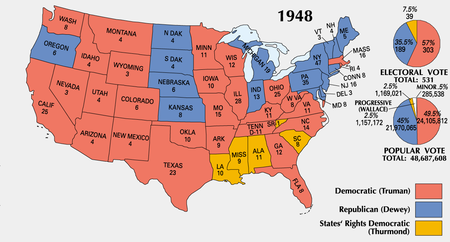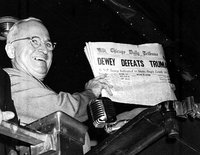U.S. presidential election, 1948
|
|
The U.S. presidential election of 1948 is best known as one of the greatest political upsets in history, as incumbent President Harry S Truman defeated Republican Thomas Dewey against the predictions of most contemporary polls and in spite of a three-way split in his own Democratic party.
| Contents |
Nominations
Republican Party nomination
In gearing up for the election of 1948, both major parties courted General Dwight Eisenhower, a popular war hero and political moderate who could carry a large number of votes on the back of his military record alone. However, Eisenhower refused, so the Republicans chose Thomas E. Dewey, the Governor of New York and a veteran of the previous presidential election of 1944. Dewey had performed surprisingly well against the popular FDR in wartime, so he was expected to easily beat the unpopular Truman.
Progressive Party nomination
The Progressive Party reinvented itself in 1948 with the nomination of Henry Wallace, a former Secretary of Agriculture and Vice President under Franklin D. Roosevelt. Briefly Harry Truman's secretary of commerce, he was fired for opposing Truman's firm stand against the Soviet Union. Wallace's 1948 platform opposed the Cold War, the Marshall Plan and big business. He also campaigned to end discrimination against blacks and women, backed a minimum wage and called for the elimination of the House Committee on Un-American Activities.
Democratic Party nomination
On July 12, the Democratic National Convention convened in Philadelphia (in the same hall in which the Republicans had nominated Dewey). Spirits were low: the Republicans had taken control of both houses of Congress and a majority of state governorships during the 1946 midterm elections by running against Truman, and his administration did not seem to have become more popular. Indeed, left-leaning Democrats had already split off to revive the Progressive Party and nominate Henry Wallace. Morale sank even further when some three dozen Southern delegates, led by Strom Thurmond, walked out of the convention in response to an announcement by Truman that his platform would advocate the passage of civil rights laws. Nonetheless, the dispirited Democrats nominated the incumbent President as their candidate by July 14th.
Dixiecrat Party nomination
The Democratic delegates who had bolted the Democratic convention over Truman's civil rights platform formed a separate party, which they named the States Rights Party. More commonly known as the "Dixiecrats", the party's main goal was continuing racial segregation and the Jim Crow laws which sustained it. South Carolina Governor Strom Thurmond, who had led the walkout, became the party's presidential nominee.
General election
Campaign
Given Truman's sinking popularity, Dewey seemed unstoppable. The Republicans figured that all they had to do was avoid any major missteps, and as such, Dewey didn't take risks. He spoke in platitudes, trying to transcend politics. Speech after speech was filled with empty statements of the obvious, such as the famous quote: "You know that your future is still ahead of you." An editorial in the Louisville Courier-Journal summed it up best: "No presidential candidate in the future will be so inept that four of his major speeches can be boiled down to these historic four sentences: Agriculture is important. Our rivers are full of fish. You cannot have freedom without liberty. Our future lies ahead." [1]
Truman, on the other hand, decided to pull the gloves off, targeting the Republican-controlled 80th Congress. The 80th Congress, led by Senator Robert A. Taft of Ohio, was much more conservative than Dewey, and was fixated on rolling back Roosevelt's New Deal. However, under Dewey's leadership, the Republicans enacted a platform at the 1948 convention which called for expanding social security, more funding for public housing, civil rights legislation, and promotion of health and education by the federal government.
Truman exploited that rift in the party by calling a special session on "Turnip Day" (referring to an old Missouri folklore about planting turnips in late July) to enact legislation consistent with the Republican party's platform. The 80th Congress played right into Truman's hands, delivering very little in the way of substantive legislation during this time. From then on, Truman dubbed them the "Do-Nothing Congress." Truman was able to ignore the fact that Dewey's policies were liberal, and ran against the conservative tendencies of the 80th Congress.
Truman toured the nation with this fiery rhetoric, playing to large, enthusiastic crowds at every stop along the way. "Give 'em hell, Harry" was a popular slogan shouted out at every stop along the tour. However, the polls and the pundits all thought that Truman's efforts were for naught, and pulled back from reporting on the already-decided election.
Results
As expected, Thurmond's Dixiecrat party took away much of the Democratic Party's traditional base in the "Solid South", while Wallace wooed away voters from the left wing of the Democratic Party. However, Wallace's failure to repudiate the endorsement of the Communist Party had undermined his popularity, and he wound up with just over 2.4 percent of the popular vote. The Dixiecrats held no attraction outside the South and got a slightly smaller percentage of the popular vote. Thus, despite the significant split in the Democratic base, Truman won on November 2, surprising many observers at the time. The Chicago Tribune had gone so far as to print "DEWEY DEFEATS TRUMAN" on election night as its headline for the following day. A famous photograph shows Truman grinning and holding up a copy of that newspaper with the erroneous headline.
Truman's victory was entirely due to his marginal wins in the large swing states of Ohio, California, and Illinois, all three of which he won by less than 1% and had a combined total of 78 electoral votes, as well as a very small victory in Idaho. Dewey countered by carrying New York and Pennsylvania, the states with the most electoral votes at the time, as well as Michigan, but it wasn't enough to give him the election. Thurmond carried four southern states, giving him a handful of electoral votes, but not enough to deny Truman the majority. Wallace won a nearly identical percentage of the popular vote as Thurmond, but failed to win a single electoral vote.
Template:Start U.S. presidential ticket box Template:U.S. presidential ticket box row Template:U.S. presidential ticket box row Template:U.S. presidential ticket box row Template:U.S. presidential ticket box row Template:U.S. presidential ticket box row Template:U.S. presidential ticket box other Template:End U.S. presidential ticket box (a) includes the four popular votes garnered by the Vegetarian Party
Source: U.S. Office of the Federal Register (http://www.archives.gov/federal_register/electoral_college/scores.html#1948)
See also
Template:Uspresidentialelections
References
Endnote
[1] Donaldson, Gary A, Truman Defeats Dewey (p. 173). The University Press of Kentucky, 1999. Quoting the Louisville Courier Journal, November 18, 1948.
External link
- 1948 State-by-state Popular vote (http://www.multied.com/elections/1948state.html)


